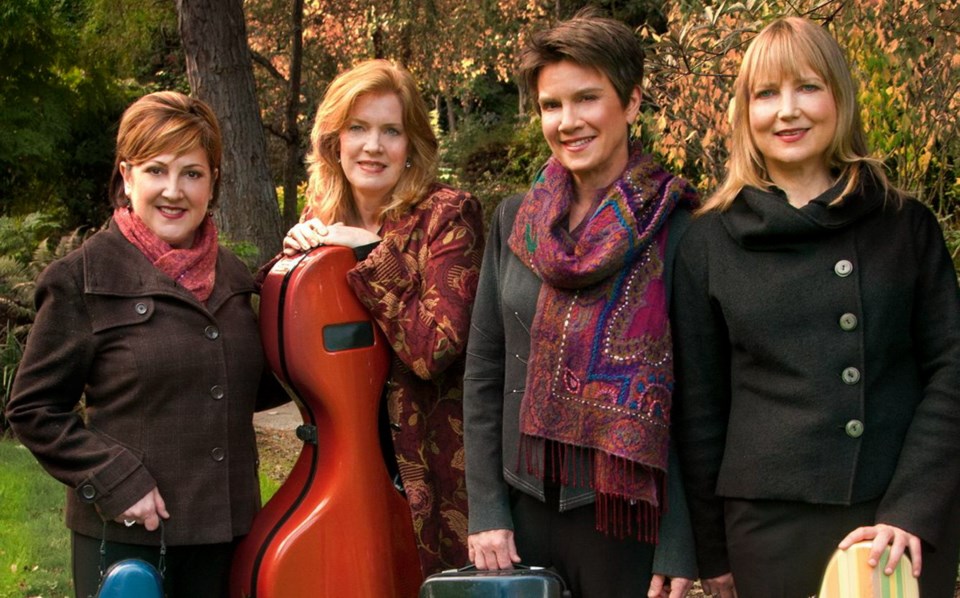PREVIEW
What: Lafayette String Quartet: Shostakovich cycle.
When: Feb. 3, 4, 6, 8, and 9; 8 p.m. Phillip T. Young Recital Hall (School of Music, MacLaurin Building, University of Victoria); pre-concert talks at 7.
Tickets: $25. Call 250-721-8480; online at tickets.uvic.ca; in person at the UVic Box Office. Festival pass $100 (by phone or in person only).
Details: finearts.uvic.ca/music/events
Next Friday, the Lafayette String Quartet, who have been artists-in-residence in the University of Victoria’s School of Music since 1991, will launch what will surely be the classical music event of the season, a complete cycle of Dmitri Shostakovich’s 15 quartets.
The Feb. 3 event is the culmination of the LSQ’s celebrations, this season, of its 30th anniversary, with no changes in personnel since the four women first came together, in Detroit, in 1986.
The cycle also pays homage to Russian violinist Rostislav Dubinsky, who, for three decades, until his defection to the West in 1976, led the renowned Borodin Quartet, which was closely associated with Shostakovich. Dubinsky was a coach and mentor to the LSQ, beginning when three of its members were students at Indiana University, and remained the women’s “musical father” until his death in 1997.
This cycle is not the LSQ’s first encyclopedic undertaking. During the 1999-2000 season, they performed all of Beethoven’s quartets here. But the Shostakovich cycle may be more ambitious, as it will take place over a single week, and the music is, if anything, more challenging.
The music is also in greater need of championship. If you doubt that, consider that the Beethoven cycle was given in UVic’s Farquhar Auditorium (which seats more than 1,000), while the Shostakovich concerts will be given in its recital hall (which seats 220).
Shostakovich’s quartets are not exactly obscure; everyone ranks them among the most important bodies of chamber repertoire. Yet, many of them are rarely heard outside of Shostakovich cycles. Only No. 8, from 1960, is a staple of the repertoire, and then mostly because it is explicitly autobiographical and hence readily accessible.
(Shostakovich wrote this harrowing work in part to expiate the shame he felt at allowing himself to be pressured into joining the Communist Party, as a condition of becoming head of the Union of Soviet Composers, and the music draws throughout on a four-note motto derived from his name.)
Shostakovich’s quartets, which span the opus numbers from 49 to 144 and constitute the majority of his chamber music, were composed between 1938, when he was 32, and 1974, the year before his death. Most of them qualify as late works, however. Only No. 1 was written before the Second World War, and quartet-writing became important to his output only with No. 4, written in 1949, the year after he was officially denounced for “formalism” by the Soviet state (his second such denunciation).
String quartets became a kind of diary into which he poured some of his most profoundly personal thoughts and feelings, so it is all the more noteworthy that the LSQ has opted to perform this cycle (unlike the Beethoven) in chronological order.
The Shostakovich quartets display an extraordinary range in terms of subject matter, style, form and expression. The First Quartet has been described as “the most easygoing of all his instrumental works,” the Fifteenth, an unprecedented sequence of six slow movements, as a work in which he “fashioned his personal pain and pessimism into a tour de force.” The quartets have from one movement to seven, and range in length from about 12 to more than 30 minutes. Moreover, Shostakovich never repeats a key, reflecting his plan to write 24 quartets, one in each major and minor key.
A distinctive, unifying “voice” does seem present throughout, though the meaning of this allusive, idiosyncratic music remains notoriously ambiguous, and it often appears to present simultaneously a public and a private face. Indeed, interpreting Shostakovich, especially since the collapse of the Soviet Union, has become so controversial and politically fraught in the West that one frequently reads of “the Shostakovich Wars.”
Some of the relevant musical and biographical issues will be aired as part of the LSQ’s cycle. Four musicologists from the United States and Europe, all with impressive records as experts on Shostakovich and his quartets, will be in town to introduce each concert. They will also come together on Feb. 5 for a short symposium at UVic.
In early April, the LSQ will repeat the Shostakovich cycle for the Kitchener-Waterloo Chamber Music Society in Ontario.



